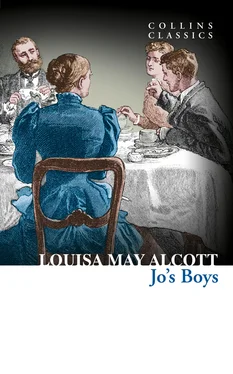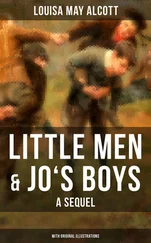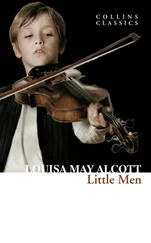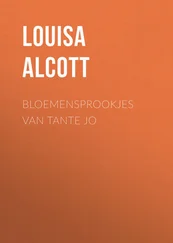In Little Men (1871), Alcott has effectively written a sequel to Little Women . However, this time Alcott investigates the rite of passage from boyhood to manhood and how masculinity is expressed and interpreted.
The plot covers a six-month period as a number of boys attend the recently established Plumfield boarding school, run by Jo from Little Women . They are a motley crew of varying personalities, and Alcott experiments with the interplay of their relationships. The book demonstrates Alcott’s concept of an ideal school, in which children are treated as individuals and encouraged to express themselves. One such example of this is that the children each have their allotted gardens and their own pets, as if they are young adults.
A character named Dan is brought into the story to mix things up. He is a streetwise orphan who decides that the other boys need to experience a few vices, so he introduces them to drinking, smoking, and gambling. He also encourages them to swear and fight one another. He is consequently expelled, but his rough edges are eventually rounded off and he takes the role of curator in the natural history museum at the school.
As with all of Alcott’s material, Little Men is not a literary novel, but it does make some degree of social comment, especially as it demonstrates that children from disadvantaged backgrounds can be turned into achievers if given the right environment and encouragement. This was in marked contrast to the general Victorian view that the underclass only had themselves to blame for their circumstance.
This humanitarian view, espoused by Alcott, was important in reforming the consensus on the role of education in society and the government’s responsibility for delivering that education. In 1870 the Elementary Education Act was passed in England, which set the ball rolling. Then the Education Acts of 1902 and 1918 established the basic framework upon which state schooling is run to this day. Schooling went from something only the privileged classes could afford to a legal right for all in society. The bottom line was a realization that society is better served when all people have the potential to learn the basics, such as reading, writing, and arithmetic. In addition, individuals with useful talents are rendered able to demonstrate their abilities and enjoy success.
By placing her characters in such a school, Alcott had set parameters to contain them, both physically and psychologically. It was rather like seeding a Petri dish to see how organisms would grow and interact within the confines. This was a useful devise for Alcott, as it enabled her to manage her characters as if they were players entering and exiting a stage.
In Jo’s Boys , written in 1886, Alcott returns to the lives of the characters in Little Women and Little Men . We respond differently to people as children and adults in real life; in this way we respond to the characters in Little Men and Jo’s Boys in different ways too. The characters now become accountable and responsible for the choices and actions in their own lives.
Jo’s Boys may be thought of as a novel for completists, those who have a desire to know what becomes of the characters as they leave their childhood days behind them. Alcott’s greatest achievement with Jo’s Boys is her portrayal of the characters’ struggles with the reality of adulthood, where a combination of both predictable and random circumstances inevitably makes their lives more complicated.
It is fair to say that Alcott manages a convincing ‘treatise on life’ with Jo’s Boys , which particularly resonates with older readers who can relate to the struggles of adulthood. In so doing, Alcott conveys the sadness that many people feel when they reflect upon their life’s journey. It isn’t all sad though, because with adulthood comes the opportunity to bring children into the world; the adults become the custodians, ready to hand over responsibility for the world. At its core, Jo’s Boys is an acknowledgement of the temporary and precious nature of childhood.
CHAPTER 1
Ten Years Later
‘If anyone had told me what wonderful changes were to take place here in ten years, I wouldn’t have believed it,’ said Mrs Jo to Mrs Meg, as they sat on the piazza at Plumfield one summer day, looking about them with faces full of pride and pleasure.
‘This is the sort of magic that money and kind hearts can work. I am sure Mr Laurence could have no nobler monument than the college he so generously endowed; and a home like this will keep Aunt March’s memory green as long as it lasts,’ answered Mrs Meg, always glad to praise the absent.
‘We used to believe in fairies, you remember, and plan what we’d ask for if we could have three wishes. Doesn’t it seem as if mine had been really granted at last? Money, fame, and plenty of the work I love,’ said Mrs Jo, carelessly rumpling up her hair as she clasped her hands over her head just as she used to do when a girl.
‘I have had mine, and Amy is enjoying hers to her heart’s content. If dear Marmee, John, and Beth were here, it would be quite perfect,’ added Meg, with a tender quiver in her voice; for Marmee’s place was empty now.
Jo put her hand on her sister’s, and both sat silent for a little while, surveying the pleasant scene before them with mingled sad and happy thoughts.
It certainly did look as if magic had been at work, for quiet Plumfield was transformed into a busy little world. The house seemed more hospitable than ever, refreshed now with new paint, added wings, well-kept lawn and garden, and a prosperous air it had not worn when riotous boys swarmed everywhere and it was rather difficult for the Bhaers to make both ends meet. On the hill, where kites used to be flown, stood the fine college which Mr Laurence’s munificent legacy had built. Busy students were going to and fro along the paths once trodden by childish feet, and many young men and women were enjoying all the advantages that wealth, wisdom, and benevolence could give them.
Just inside the gates of Plumfield a pretty brown cottage, very like the Dovecote, nestled among the trees, and on the green slope westward Laurie’s white-pillared mansion glittered in the sunshine; for when the rapid growth of the city shut in the old house, spoilt Meg’s nest, and dared to put a soap-factory under Mr Laurence’s indignant nose, our friends emigrated to Plumfield, and the great changes began.
These were the pleasant ones; and the loss of the dear old people was sweetened by the blessings they left behind; so all prospered now in the little community, and Mr Bhaer as president, and Mr March as chaplain of the college, saw their long-cherished dream beautifully realized. The sisters divided the care of the young people among them, each taking the part that suited her best. Meg was the motherly friend of the young women, Jo the confidante and defender of all the youths, and Amy the lady Bountiful who delicately smoothed the way for needy students, and entertained them all so cordially that it was no wonder they named her lovely home Mount Parnassus, so full was it of music, beauty, and the culture hungry young hearts and fancies long for.
The original twelve boys had of course scattered far and wide during these years, but all that lived still remembered old Plumfield, and came wandering back from the four quarters of the earth to tell their various experiences, laugh over the pleasures of the past, and face the duties of the present with fresh courage; for such home-comings keep hearts tender and hands helpful with the memories of young and happy days. A few words will tell the history of each, and then we can go on with the new chapter of their lives.
Читать дальше












